- Home
- David Downing
The Red Eagles
The Red Eagles Read online
PRAISE FOR DAVID DOWNING
‘Think Robert Harris and Fatherland mixed with a dash of Le Carré’
Sue Baker, Publishing News
‘A wonderfully drawn spy novel … A very auspicious début, with more to come’
The Bookseller on Zoo Station
‘Excellent and evocative … Downing’s strength is his fleshing out of the tense and often dangerous nature of everyday life in a totalitarian state’
The Times on Silesian Station
‘Downing’s outstanding evocation of the times (as masterly as that found in Alan Furst’s novels or Philip Kerr’s Bernie Gunther series), thematic complexity (as rich as that of John le Carré), and the wide assortment of fully rendered characters provide as much or more pleasure than the plot, where disparate threads are tied together in satisfying and unexpected ways.’
Library Journal on Masaryk Station
‘Exciting and frightening all at once … It’s got everything going for it’
Julie Walters on Zoo Station
‘A master at work’
Huffington Post UK
‘An outstanding thriller … This series is a quite remarkable achievement’
Shots magazine
THE RED EAGLES
David Downing
He has fully become a man
who has in his heart no mother, father
who knows that he gets life
only as an extra to death
and, like something found, he will give it back
at any time, that’s why he keeps it safe,
who is not a god and not a priest
either to himself or anyone.
—from “Consciousness” by Attila Jozsef
Contents
Title Page
Epigraph
Prologue
Conception
One
Two
Three
Four
Execution
Five
Six
Seven
Eight
Nine
Ten
Eleven
Twelve
Thirteen
Epilogue
Copyright
Prologue
New York City, 1944
Her contact stood with his back to the delicatessen window, in one hand the book with the green binding, in the other the spare pair of gloves. Though it was night, Amy could tell he had a rather nice face; there was a hint of innocence about it. As if by rote, she glanced up and down the street one more time, saw nothing, and then took the orange out of her bag and started walking toward him.
Amy was strangely nervous – she could tell from the way the sound of her heels on the sidewalk seemed to echo. He noticed her and the orange, looked surprised for an instant, then wary.
“Can you tell me the way to Grand Central Station?” she asked.
His face relaxed. “I’m going that way myself,” he said, as if it were an old joke.
“Harry’s sick and couldn’t make it,” she said, and it was at that moment that she saw, reflected in a window, a man staring at them. Her reaction was so quick she even startled herself. She took her companion’s arm and forced them both into motion with a suddenness that almost knocked him over.
“What …”
“We’re being watched. Don’t turn around,” she whispered.
They walked west toward Lexington Avenue, the clicking of her heels sounding louder than ever.
“What do we do?” he asked.
“Where are you staying?”
“The Pierre.”
“Stop and tie your shoelaces.”
As he did she looked back. The man was there, staring at a fire hydrant. “Damn,” she murmured to herself. She’d been so careful and still it hadn’t been careful enough.
They resumed walking, turning onto Lexington past a newsstand announcing the Allied attack on Monte Cassino.
“They must know something,” he said, but there was no panic in his voice, and for that she was grateful.
“If they knew anything, you wouldn’t still be on the street,” she said, as much to convince herself as him. “It’s just routine surveillance. I’ve got an idea. It’s risky, but there’s nothing else we can do. You’re a single man in New York. If they believe I’m a hooker …”
“But …”
“Can you think of anything better?”
He said nothing. She hailed a cab and watched through the rear window as their tail signaled a car that had been cruising along behind him.
Reaching the hotel, they crossed the lobby to the elevators. Amy was conscious of the stares she received from the men as she strutted by with an exaggerated sway of her hips. She hoped she wasn’t overdoing it for her intended audience.
He had a suite on the fifth floor. It was large and luxurious; the United States Government obviously was not economizing when it came to important scientists. “We’d better get undressed,” she said, kicking off her shoes and taking off her coat.
He looked at her as if she’d gone mad.
“They’ll check,” she said patiently. If they’re any good, they will, she added to herself.
She peeled off her precious nylons, unbuttoned her skirt and blouse. “I’ll get in bed,” she said, carrying her clothes through to the bedroom.
“Shall I?” he asked almost apologetically.
“They won’t check that thoroughly.”
A few moments later he came in and sat on the end of the bed, looking extremely ill at ease in his underpants. She smiled at him reassuringly, though she felt anything but assured. Excited perhaps. He did have a nice face, and his body, though thin, was well-proportioned. It was a long time since she’d made love with a complete stranger … but this wasn’t the time for thinking about it.
They sat silently, waiting for more than ten minutes. “No one’s coming,” he said at last, but before he could utter his next thought there was a firm rap on the outer door.
“Put the dressing gown on,” she said. “Take your time answering. Be annoyed.” She removed her brassiere, and he got a glimpse of small, perfectly formed breasts with large dark nipples.
She heard him open the door amid his angry protests.
“I’m sorry, Mr. Fuchs,” a voice replied, “but we have to check the water in all the rooms. It won’t take but a second.”
She slipped out of bed and stood with her back to the window, completely naked. The door opened abruptly and the man walked in, stared at her for what seemed an eternity and then backed out muttering apologies. She could hear him still apologizing in the living room as the scientist resumed his protests. Then the outer door slammed, leaving silence.
She began to dress. He came back into the bedroom and did the same, neither of them speaking. Amy felt an almost incontrollable urge to laugh, but the young scientist’s face was pale, his mouth pursed in a grim line.
“Was it the same man?” he asked.
“Yes.”
“He didn’t even check the water.” He looked at her. “You weren’t in bed when he walked in on you.”
“I didn’t want him to look at my face,” she said coolly.
He looked at her with admiration. “Well, we fooled them!”
“It’s not over yet. Let me think a minute.”
He left her sitting on the bed, straightening her nylons. What was going to happen when she left? Would they check her out? They might be satisfied.
He returned a few minutes later with a small manila envelope. “That’s what Harry asked for,” he said.
She folded it in two and put it in her handbag. “Is there any reason why you shouldn’t have had it in your possession, innocently I mean?”
“No. We’re always scr
ibbling things like that.”
“Good. If I’m arrested, tell them I stole it. Say you threw me out when you caught me looking through your wallet but you didn’t realize I’d taken anything.”
“Would they believe it?”
She shrugged. “It’s better than nothing. They need you presumably, so they’ll want to give you the benefit of the doubt. And tomorrow you’d better bring a real hooker up here.”
“But I …”
“You must. They can’t remember this night in particular. Believe me, it’s more fun than the electric chair.”
“You’re right.”
She grimaced. “Look, if they’re waiting to question me, they’ll be in the lobby. I don’t think they’ll approach me if you’re there, so why don’t you call a cab for me and then see me to it. I’ll take it from there.”
“I thought I threw you out.”
“You threw me out like a gentleman.”
He called down to reception, watched her applying her lipstick as he waited, a dark crimson shade that suited her shining black hair.
“What name should I know you by?” he asked.
“Rosa. But Harry should be back next time.”
They went down in the elevator and walked across the lobby as fast as they could without arousing suspicion. She saw the man out of the corner of her eye, pulling himself out of an armchair.
The taxi was waiting. “Times Square,” she told the driver as he pulled out onto Fifth Avenue. Looking back, she saw Fuchs walking back into the hotel and the man getting into a car that had pulled up for him.
Damn, damn, damn. For the first time she felt really frightened, and almost wished she’d brought the scientist with her – as long as she’d had him to worry about she hadn’t had time to worry about herself. She reached inside her bag, felt the butt of the small revolver, but it offered no comfort. There was no way she could lose the pursuit in a cab, and the moment it stopped he’d have her.
“Make that Forty-second and Madison,” she told the driver.
He swore and swung the cab under the nose of a bus and down another canyon. “Tell me when you change your mind again.”
Amy ignored him and noticed that her fists were clenched tightly in her lap. She took out a cigarette and fumbled with the lighter. The cab screeched to a halt. “You’re there, lady.”
She paid the driver and got out, not daring to look back. After stamping out the cigarette she began walking east on Forty-second Street, unbuttoning her coat and avoiding the eyes of the women who occupied the doorways. Eventually finding one empty, she leaned against the doorjamb wondering what she was supposed to do next. The man’s car stopped right in front of her. Amy forced a smile to her face. He was sitting in the back, pulling down the window to stare straight at her, a lecherous grin on his face.
Drive on, she pleaded silently.
He got out of the car and walked over to her, showed her his police shield. “Come with me, miss,” he said, looking her up and down.
“What for? Why are you picking on me?”
He took her arm and threw her into the backseat of the car, then got in beside her, holding his thigh tight against hers. He stank of sweat and stale beer. “Drive, Junior,” he told the man in front.
“What’s your name, honey?” he asked.
“Eileen. Where …”
“Eileen what?”
“Eileen McCarthy.”
“How long have you been a whore?”
“Not long. Look …”
“You’re gorgeous naked.”
Now she knew. More fun than the electric chair, she’d told Fuchs.
“Wasted on that egghead, I thought,” he said, placing his hand on her thigh.
“He was rather sweet,” she said, frantically trying to think of something that would stop him.
He guffawed. “Yeah? So am I, so am I. Look, honey,” he said, suddenly tightening his grip on her thigh, “we can take you in and you’ll get twenty-four hours in the slammer and a fifty-dollar fine, or you can give me twenty-five dollars’ worth of your time and be back on the street in half an hour. Your choice.”
They were entering Central Park. There was no way out of it, no way at all. If she was taken in, they’d find the gun and the envelope and her real name. “Okay, I’m yours,” she said.
He smiled that smile. “You know where, Junior,” he told his partner.
A few minutes later they turned off the road and coasted down a slope and into the trees. “Junior’ll make sure we have some privacy,” he said, and the young driver, with one disinterested glance at her, got out of the car and walked away.
“Look,” she said, but he was already opening up her blouse, squeezing a breast as if he was testing the ripeness of a peach. She felt her hand brush the metal clasp of her bag, and for a second almost succumbed to the urge to pull out the gun. But somehow it helped just knowing it was there, knowing that she could blow his head off if she wanted to.
He wasn’t gentle but at least it was quick. She pulled up her skirt and buttoned up her blouse, not daring to look him in the face.
“I’m pretty sweet too, eh?” he said.
“Can I go now?” she asked quietly.
“We’ll take you back.”
“I’d rather walk.”
“Your choice. I’ll see you again, Eileen.”
She got out of the car, clasping her handbag, and walked away, passing Junior. At least it had been only one of them.
After walking for several minutes she suddenly felt weak and sat down on the grass, her back against a tree. She wanted to cry but she couldn’t. She wanted to be angry with the cop, but he really had thought she was a hooker. She’d been so goddamn clever. “I didn’t want him to see my face” – she could hear herself say it, so cool and collected and pleased with herself. Well, he’d seen it now.
With an effort she pulled herself to her feet and walked out of the Park at Columbus Circle. Then she took a cab to Penn Station and caught a train back home to Washington with minutes to spare.
In the washroom at the end of the car she stripped and washed herself. She stood still, her arms astride the basin, looking at her face in the mirror.
Ten years, she thought, ten years of deception. Deceiving others, and maybe herself as well. She was thirty-three years old. No husband, no children, no country. No future.
Remembering the manila envelope, she took it from her bag and opened it. Inside there was a single sheet of paper, and on it a complicated diagram surrounded by notes written in her and Fuchs’s native tongue. At the head of the sheet were two heavily underlined words – “Die Atombombe.”
Conception
One
Josef Stalin stared gloomily out of the limousine window at the rain-swept Moscow streets. It was only eleven o’clock, but the city seemed already to have put itself to bed, and the swish of the limousine’s tyres seemed to echo in the emptiness. His eyes returned again to the piece of paper that rested on his knees, this diagram drawn by a German scientist in far-off America. Just one sheet of paper. There has to be some way of speeding up the process.
But deep down he feared that there wasn’t, that this time the odds were stacked against him. Ten years earlier he’d told the Party of the German danger, had spelled out what needed to be done to prevent the Soviet State from being crushed. It had been close, closer than even the Germans knew, but he’d done it. This, though, was something altogether different. Some things could not be simply commanded, no matter how great a sacrifice was made.
Eighteen months, the GRU told him. The American bomb would be ready in eighteen months, ready for the “peace.” The Soviet Union would have less than three years to match the American achievement while war weariness and the sentimental attachment to the “Grand Alliance” remorselessly ebbed away. A collision course was set. He’d had no illusions about the Germans, he had none about the Americans. A bare twelve months ago the taking of half of Europe had promised an impregnable buffer, and now it
seemed almost irrelevant.
He felt a surge of self-pity. Were all his achievements to be reduced to nothing by this single sheet of paper? It was not long since he’d told Beria that he almost felt sorry for Churchill and the English, whose world was being dragged out from under them, who would soon be no more than the curators of an island museum. But was Churchill, with his pathetic faith in American generosity, the only deluded one? He himself had talked to the American generals at Tehran, and it had been like talking to the Germans at the time of the Pact. The stench of raw arrogance. The moment the Germans and Japanese were beaten the Americans would be everywhere, easing out the British and French, buying up the biggest empire the world had ever seen, brandishing their new bomb. Russia would be alone again. And defenseless. He slammed his fist on the seat, making the chauffeur jump. There must be some way of speeding up the process.
The limousine swept through the Spassky Gate and into the Kremlin, which was ablaze with lights now that the air-raid precautions had been lifted. He was, as usual, an hour late for the council meeting and felt able to expend some of his frustration on a brisk walk to the chamber overlooking the Alexandrov Gardens. Perhaps, he thought to himself as he climbed the stairs, but any lingering hopes were erased by the twin rows of gloomy faces lining the table. He wasted no time on preliminaries.
“Well, Andrei Andreyevich?” he barked as he eased himself into his chair.
Comrade Zhdanov, the head of the newly formed Atomic Division, shuffled his papers.
“Well?” Stalin repeated. “Tell me about our atom bomb.”
“Yes, Comrade Secretary,” Zhdanov began. “I have conducted the investigations required, but I regret to have to inform the council that there is no significant change in the forecasts. We simply do not have the materials. It may be possible to complete the ten-year development program in eight years, but the consequences of such a concentration of resources will put immeasurable strains on the rest of the economy.

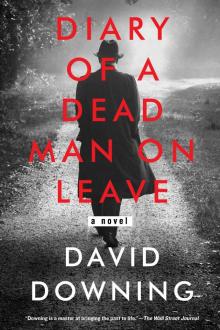 Diary of a Dead Man on Leave
Diary of a Dead Man on Leave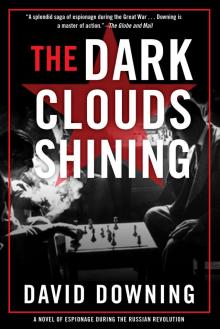 The Dark Clouds Shining
The Dark Clouds Shining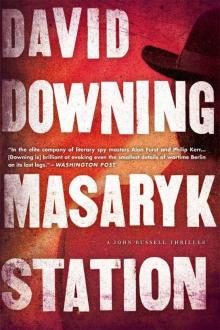 Masaryk Station (John Russell)
Masaryk Station (John Russell)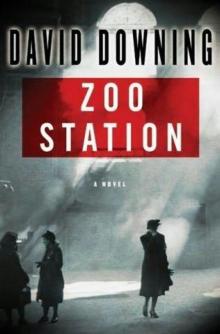 Zoo Stationee
Zoo Stationee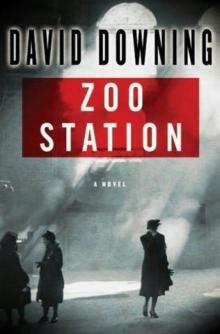 Zoo Station jr-1
Zoo Station jr-1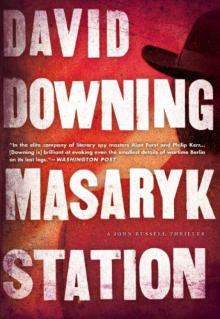 Masaryk Station
Masaryk Station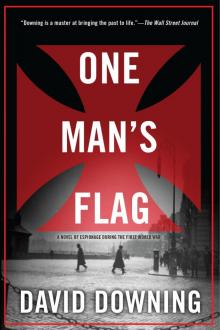 One Man's Flag
One Man's Flag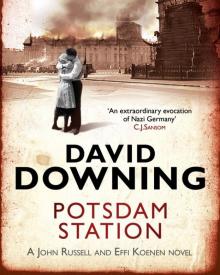 Potsdam Station jr-4
Potsdam Station jr-4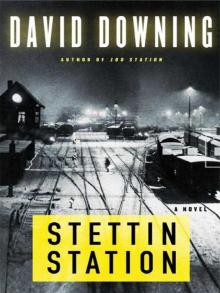 Stattin Station jr-3
Stattin Station jr-3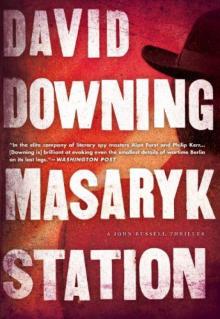 Masaryk Station jr-6
Masaryk Station jr-6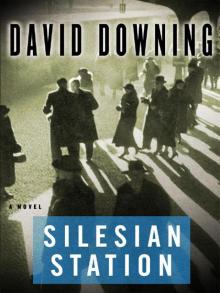 Silesian Station (2008) jr-2
Silesian Station (2008) jr-2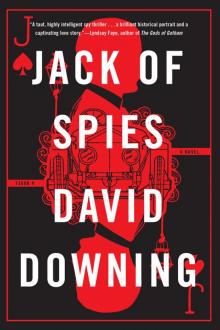 Jack of Spies
Jack of Spies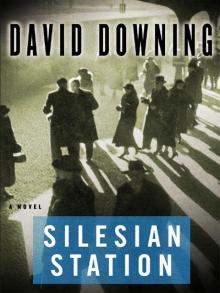 Silesian Station (2008)
Silesian Station (2008) The Moscow Option
The Moscow Option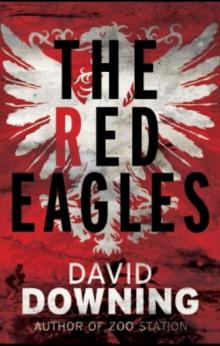 The Red Eagles
The Red Eagles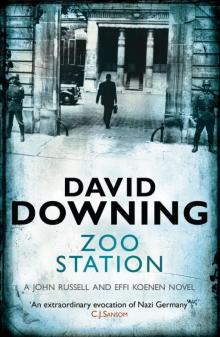 Zoo Station
Zoo Station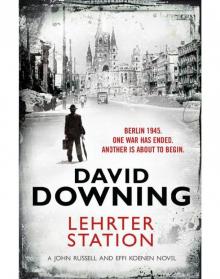 Lehrter Station
Lehrter Station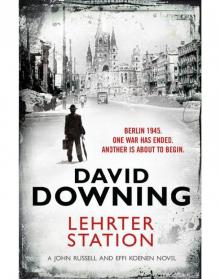 Lehrter Station jr-5
Lehrter Station jr-5